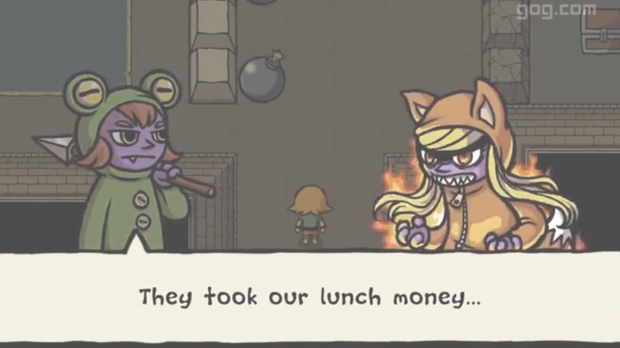What’s in a name? In this case, a lot. Imagine a composer writing a fugue directly in the style of Bach, scrawling sarcastic comments in the margin of the score, and then naming it something deflating, maybe Güd Enüf. This is the odd proposition underlying Ittle Dew–go ahead, sound it out–a Zelda-alike from indie developer Ludosity. The proposition? That the difference between a blatant rip-off and a nostalgic pastiche is only a self-deprecating wink.
Zillions of games have taken inspiration from Zelda’s overworld/underworld structure, its map-expanding equipment collection, its trap-laden dungeons; it’s a safe bet that almost any action-RPG utilizes some trope epitomized by the franchise. Ittle Dew goes even further, trumpeting its allegiance to the early top-down Zelda games to the point where it’s less a parody of them than of the widespread mimicry of the franchise–not to mention a study in the mitigating powers of irony. If the game were called something generic like Sword of Destiny and took itself a little more seriously, we’d be excoriating it for plagiarism rather than praising it as a fun, polished but limited experience.
In a way, Ittle Dew imagines an alternate universe where the early Zelda games had been made by the LucasArts team behind the Monkey Island series in the age of browser-friendly flash graphics. The hand-drawn art is simple and cartoony, with a heavy, flickering contour line adding vibrancy to the dancing trees and cuddly characters. The spirit of Monkey Island is particularly strong in the item shop, manned by a pirate and crammed with nautical bric-a-brac, where Ittle gradually acquires the three items that facilitate combat and puzzle-solving. But it permeates the entire game in over-the-top metafictional humor.
Like Link, the treasure hunter Ittle starts the game with only a wooden stick and sets out to expand the game world through new items and puzzle-solving. Unlike Link, Ittle is female, though you might not notice it without reading the game’s supplementary materials, which may be a goof on the androgyny of Nintendo’s seminal hero. She receives obscure advice from men in caves, battles thinly veiled copies of Peahats and Like-Likes (they look like those novelty gum hamburgers) that move in straight lines like chess rooks, and collects Magic the Gathering-style cards that the game tells you upfront are worthless.

She even has a Navi–i.e., an annoying helper-creature–in Tippsie, a talking fox with dragonfly wings who provides hints and sarcastic color commentary. While some of the jokes are broad and easy, Tippsie provides some genuine grins, quaffing red health potions behind Ittle’s back (because the hero needs to keep her head clear, which thus implies that Link was a boozer). The best sight-gag in the game is the health hearts that fall from defeated enemies with a satisfyingly juicy plop, turning a symbol into a grotesque reality. In one conversation scene, Ittle can be seen eating one like an apple, blood smeared on her mouth, to Tippsie’s shock and disgust.
But the biggest trick Ittle Dew pulls is that, under all the Hyrulian frills, it isn’t that much like Zelda at all. At its core, it’s less of an action-RPG than a Sokoban-style game where you shove blocks onto pressure plates to clear rooms in the castle where you spend most of your time. I happen to find dragging blocks around fairly tedious, and it’s to Ittle Dew’s credit that it held my attention with its humor and atmosphere despite this.
Of course, it helps that it only asks for about 3 hours of my time to begin with. Repeat playthroughs are encouraged via speed runs, expert shortcuts, and achievements for finishing without all three magic items (supposedly, resourceful players can get through with any two of them). Of course, that depends on whether you find enough depth in the game-world to take that plunge. Failure to reinvent the wheel isn’t failure when you haven’t tried, but low stakes have low payoffs. Ludosity’s block-pusher disguised as love letter to Link isn’t likely to add much to your concept of the series or gaming as a whole. But as a fun way to fritter away a few hours in a familiar, welcoming space, it’ll do.
Images via Ittle Dew trailer.
Additional editorial support by Nina Freeman.
